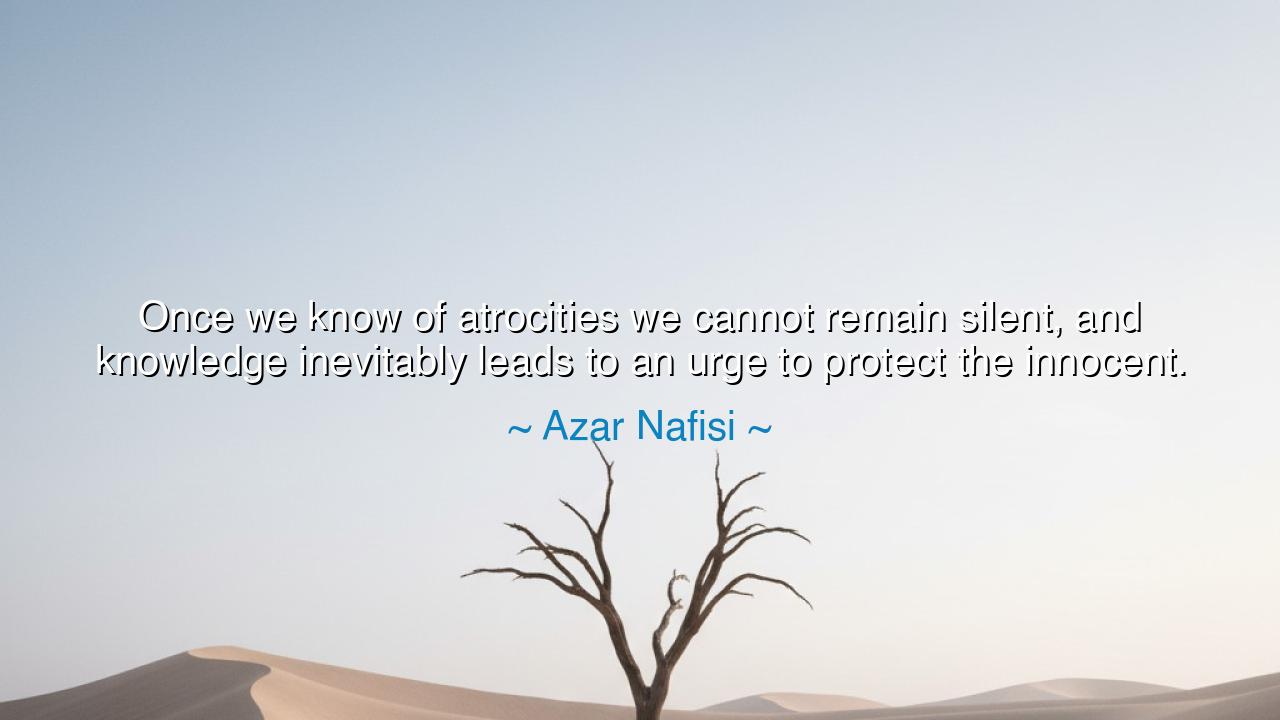
Once we know of atrocities we cannot remain silent, and knowledge
Once we know of atrocities we cannot remain silent, and knowledge inevitably leads to an urge to protect the innocent.






Hear the words of Azar Nafisi, who bore witness to tyranny and carried the torch of truth: “Once we know of atrocities we cannot remain silent, and knowledge inevitably leads to an urge to protect the innocent.” In this solemn declaration lies the eternal command of conscience: that silence in the face of cruelty is itself a form of surrender, and that the gift of knowledge carries with it a duty—a duty to act, to speak, to defend those who cannot defend themselves.
The ancients taught that to see injustice and turn away is to wound one’s own soul. The great philosopher Cicero wrote that justice is not only refraining from doing wrong, but also preventing wrong when it can be stopped. So Nafisi reminds us: knowledge of atrocities is no passive possession. It is a spark that burns the heart, a call that demands response. To know and yet to remain silent is to betray both the truth and the innocent who suffer.
Consider the story of Raoul Wallenberg, a Swedish diplomat during the Second World War. When he learned of the horrors of the Holocaust, he did not content himself with reports and pity. He acted. With forged passports and safe houses, he saved tens of thousands of Jewish lives in Hungary. His courage was born of knowledge—once he knew the atrocity, silence was impossible. His story embodies Nafisi’s truth: to know suffering compels us to protect.
Contrast this with the silence of many who turned their faces away in that same era, who knew of trains and camps but chose comfort over conscience. Their knowledge was buried beneath fear or selfishness, and their silence became complicity. Thus Nafisi’s words are not merely an observation—they are a warning. Knowledge demands responsibility. To ignore it is to let evil grow unchecked.
Her statement also touches the deepest root of humanity: compassion. When the heart is awake, knowledge does not harden but softens. It awakens an urge to protect the innocent, to shield the weak, to stand between cruelty and its victims. This is the origin of heroes, not in strength alone but in compassion married to knowledge. Without compassion, knowledge becomes cold; without knowledge, compassion is blind. But together, they form the power to resist darkness.
The meaning of her words is timeless. In every generation, atrocities arise—wars, persecutions, injustices small and great. And in every generation, the test returns: will we remain silent, or will knowledge stir us to courage? The answer defines not only nations but the very worth of a human soul. For silence is easy, but costly; action is hard, but redemptive.
The lesson for us, O seekers, is this: do not turn away when you learn of suffering. Do not say, “It is not my concern.” The moment you know, it becomes your concern, for knowledge is a torch that places responsibility in your hands. Speak where others are mute, act where others hesitate, defend where others abandon. Protect the innocent, for in doing so, you protect the humanity within yourself.
Thus let Nafisi’s words be engraved upon our hearts: knowledge is not neutral—it is a summons. To know of atrocities and remain silent is to share in them; to know and to act is to stand with the innocent and the just. Choose always to act. For though the world is darkened by cruelty, one voice raised in truth, one hand stretched to protect, becomes a beacon that cannot be extinguished.






AAdministratorAdministrator
Welcome, honored guests. Please leave a comment, we will respond soon